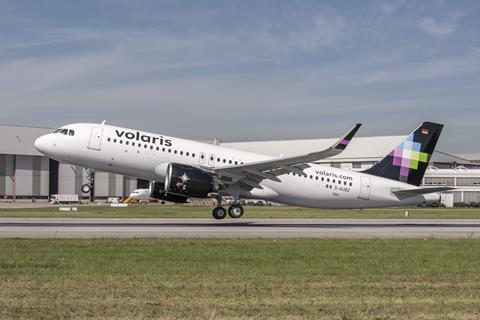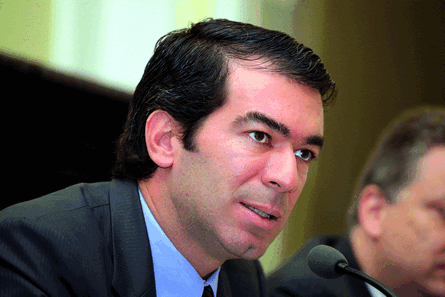Mexican ultra-low-cost carrier Volaris has disclosed a first-quarter profit of $33 million – its first since 2019 – as the company kept a sharp eye on costs and despite the hit to capacity caused by the enforced grounding of Pratt & Whitney geared turbofan (GTF)-powered aircraft.
The Mexico City-based airline said on 22 April that revenue during the three months ended 31 March was $768 million, up 5.1% from the same period in 2023.
“We are pleased with our business performance as our Volaris team delivered strong first-quarter 2024 results,” says chief executive Enrique Beltranena. “Over the last six months, our primary focus has been directing operations to enhance our customer service and continuing our emphasis on obsessive cost control.”
The first-quarter profit, he adds, “marks a significant achievement, as historically, due to seasonality, our first quarters have resulted in net losses”. During the first quarter of 2023, the carrier turned in a net loss of $71 million.

Costs during the period fell 12.9%, to $664 million, driven by a 25% decline in fuel prices.
Volaris transported 6.9 million passengers during the period, down 15% on the same quarter in 2023. The number of Mexican domestic passengers decreased 23%, while international passengers increased 11%.
Capacity, as measured in available seat miles, fell 13.4% primarily owing to the P&W engine recalls.
Last October, Volaris said as many as 73 of its aircraft – 51 Airbus A320neos and 22 A321neos – could be affected by the GTF issue over the coming years; at that time the carrier had 16 aircraft grounded due to the problem.
Volaris is just one of more than 20 carriers worldwide that is dealing with the issue. The inspections can mean that an aircraft is out of service for up to 360-365 days.
For the full year, the airline maintains its expectations that capacity will decline by 16-18% due to the P&W engine inspections. In the second quarter, the figure is expected to be closer to 18%. By contrast, the airline increased capacity 18.1% in the second quarter of 2023, and by 10% for the full year.
The airline achieved an EBITDAR margin of 30.6% during the quarter, almost double that of the same period in 2023, and expects the figure to increase to between 31-33% during the second quarter. For the full year, Volaris expects EBITDAR could be as high as 34%.
“The second-quarter and full-year 2024 outlook… includes the compensation that Volaris expects to receive for the projected grounded aircraft resulting from the GTF engine removals, in accordance with the company’s agreement with Pratt & Whitney,” it says.
In December, Volaris said its agreement with P&W, which it did not quantify, “will help address fixed costs associated with the engines during inspections”.
The airline ended the first quarter with 134 aircraft in its all-Airbus narrowbody fleet, up from 120 at the end of the same period last year, and five more than it had at the end of 2023.


























